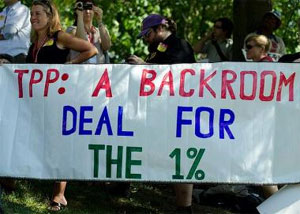Fast-Track legislation was introduced in the House and Senate today.
The bill gives President Obama Fast-Track authority for trade deals, notably the Trans-Pacific Partnership (TPP) and the US-Europe trade agreement, Transatlantic Trade and Investment Partnership (TTIP), currently under negotiation.
Fast-Track authority means President Obama can negotiate and sign trade pacts without input from Congress, only sending them the final agreement for an up or down vote – no amendments allowed! and limited floor debate.
Like the Iran negotiation, Obama says it would be almost impossible to reach a final agreement if trading partners think Congress can intervene and pick apart the deal.
But unlike the Iran negotiation, where Congress is clearly threatening to intervene, they are willing to stand by and let Obama make trade deals without any oversight.
While you might say Congress wants more control over the Iran deal because it is more important, the Trans-Pacific Partnership alone will govern trade for 40% of the world’s economy.
"This fast-track bill is toxic for Congress and for our air, water, and climate. We’ve seen this all before. This bill replicates an old, failed model of trade authority that rushes deals through Congress and strips out vital protections and oversight that ensure trade pacts benefit American communities, workers, and the environment," says Michael Brune, who heads the Sierra Club.
Every single labor union, environmentalists, and most Democrats are firmly against Fast-Track. It may not be a shoe-in for Republicans either, given the sovereignty issues in the bill.
Essentially, corporations would be elevated to nation-status, with the ability to sue governments in private trade tribunals – for unlimited amounts of money – over anything that gets in the way of profits.
This is scary stuff: multinationals could "protect their future profit potential" by suing cities, counties, states or countries to wipe out existing laws in our country. Any local ordinance could be challenged as a "barrier to trade."
Is renewable energy cutting into oil company profits? Are our environmental laws that protect air and water quality impinging on corporate profits? Requirements for fracking or oil drilling too onerous? Want to get rid of a minimum wage?

Joint House/ Senate Fast-Track Bill
At least some Senate Democrats will have to sign it, so there are some compromises in the bill.
One of the many objections to the deal are the secret negotiations. The final bill requires US trade officials to give Congress and the public access to the terms of the deal before it is signed.
In exchange for a Yes/No vote, the bill lists 150 objectives for US trade negotiators, in areas like currency manipulation, human rights, worker rights and the environment. If they don’t end up in the final deal, Fast-Track authority is automatically revoked.
"If we want to have a healthy economy with better jobs and bigger paychecks for more families and individuals, we must engage with other nations through trade," says Senator Orrin Hatch (R-UT), Chair of the Senate Finance Committee, which approved the bill to go to the floor.
Since the US has lost millions of jobs through NAFTA and every single other trade bill, it’s hard to imagine how this will benefit American workers. They will be competing with people who make $0.75 an hour in Vietnam, where there are few, if any, protections for workers, or the environment.
TPP is commonly called NAFTA on Steroids.
Read our articles, Doctors Say: Show Us the Trans-Pacific Partnership Deal and After 20 Years of NAFTA, Do We Want More Trade Agreements?
Call your representatives (888-804-8311) or email them from this website, where you can learn more:

